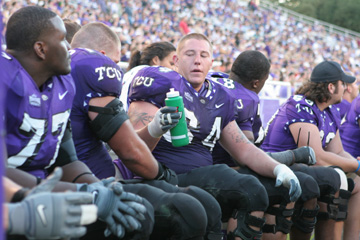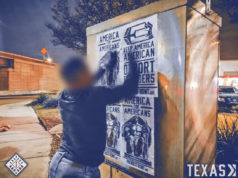After a concert at The Moon, a bar and music venue on Berry Street near Texas Christian University, last July, Jordan Roberts and Greg Mulholland were saying their goodnights to several friends outside the nearby Fuzzy’s Tacos.
 It was a little before 2 a.m., and the show at the neighboring Aardvark club was just letting out. When two men leaving that club made obscene remarks to two of the young women who were with Roberts and Mulholland’s group, an angry argument followed. But what should have been a pretty mundane show of testosterone turned menacing when a prominent TCU football player — whose MySpace page until recently showed him holding two assault rifles — jumped into the mix.
It was a little before 2 a.m., and the show at the neighboring Aardvark club was just letting out. When two men leaving that club made obscene remarks to two of the young women who were with Roberts and Mulholland’s group, an angry argument followed. But what should have been a pretty mundane show of testosterone turned menacing when a prominent TCU football player — whose MySpace page until recently showed him holding two assault rifles — jumped into the mix.
Roberts, Mulholland, and others say Mathew Lindner, a senior offensive lineman for the Horned Frogs, from Comfort, Texas, and friend of the two mouthy men, showed the gun in his waistband to the other group and threatened to make them “bleed.” The owner of the Moon, Chris Maunder, who was among the dozen or so bewildered observers, called 911. A few minutes later, however, he called back to cancel the request for an officer, since Lindner had left. No official police report was ever filed.
Roberts said the 6’4”, 298-pound Lindner, who has started every game the last two seasons, repeatedly threatened him and his friends with physical harm. “He walks up, and he starts telling us that he’s going to ‘make us bleed,’” said the 27-year-old. “He had that really angry ‘I’m-going-rip-someone’s-head-off’ look, and he pulls up his shirt, and he had a gun tucked into his pants.” He didn’t know who Lindner was at the time, Roberts said, but after someone suggested he was a TCU football player, he found Lindner’s pictures on the internet and confirmed his identity. Mulholland, 28, said that he didn’t think that the situation would have gone beyond macho posturing had Lindner not entered the scene. “I walked up, and I was telling them that there’s no point in fighting, you’ll win, so how about we just not do this,” he said. “Then Matty [Lindner] showed up and got in my face.” Mulholland said that he had turned to walk back toward the Moon when Lindner pulled his shirt up, flashed the gun, and told him to “watch who you’re fucking with. Next time I’ll leave you open and bleeding, and you won’t walk away.”
The incident apparently was not Lindner’s first connection to off-the-field violence. A few months earlier outside of the Pour House Pub on 5th Street in downtown Fort Worth, witnesses said Lindner took part in an assault on Kurt Wallace that cost Wallace six hours in the emergency room and almost $8,000 in medical bills for repairing a hole in his ear. Witnesses said Wallace, 38, was hit from behind and kicked. His attackers fled before police arrived. “The first thing I remember is waking up in the hospital,” Wallace said. Later, “I went to [apply] for victim’s assistance, and the police said that no report was ever filed.” Ryan Kelly, who witnessed the attack, said that Lindner provoked Wallace and then, after one of his companions sucker-punched Wallace from behind, kicked the man as he lay on the sidewalk. “We were walking down the stairs, and a bunch of TCU football players were standing in front of the door,” Kelly said. One member of the TCU group told another member to get out of the way. But the second man, referring to a woman in Kelly’s group, responded by saying “Fuck that bitch, I’m not moving for her.”
According to Kelly, Wallace then confronted the man, prompting Lindner to take off his shirt and threaten him. When Wallace and Lindner were face-to-face, another man, whom Wallace and Kelly allege is also a TCU football player, punched him from behind. TCU’s web site home page talks about its mission of educating students “to think and act as ethical leaders and responsible citizens” — but top TCU officials worked hard over the past six weeks or so to sidestep the ethical questions raised by the allegations against one of their more prominent athletes. Head football coach Gary Patterson refused repeated requests by Fort Worth Weekly to talk about the incident. After more than a month of promising to try to set up an interview with Patterson, TCU media relations director Mark Cohen eventually said it is the school’s policy not to respond to allegations. However, a source close to Patterson, who asked not to be named, said the coach had heard about both incidents and that Lindner told his coach that, in the Berry Street incident, it was just a cell phone case he had tucked into his pants. Patterson’s only action, the source said, was to encourage Lindner to stay away from the Berry Street bar scene, though Roberts and Mulholland both saw him at the Aardvark the week after the incident.
Daniel B. Morrison Jr., director of TCU men’s athletics, initially said he would have no comment until he learned more about the incident. That was two weeks ago, and by Tuesday, Morrison had failed to return any subsequent calls from the Weekly.
TCU Chancellor Victor Boschini also declined comment. He called the incident a “personal matter” for Lindner. The Weekly managed to contact Lindner through Facebook, an online networking site similar to MySpace. His only response was that “You have to leave me alone.” The accusations against Lindner seem to fit a pattern in college athletics. Many of the bigger and more successful college football programs have had problems with players breaking the law or engaging in violence or aggression off the field. Universities such as Miami and Florida State have notoriously allowed their players to run roughshod over university rules and local laws, with few repercussions. A few hours south of Fort Worth, the University of Texas football team boasts a collective rap sheet that resembles something closer to that of a street gang than a college football team. But players’ brushes with the law apparently had little effect on their pro careers: After UT won the national championship two years ago, several players who’d been accused of various crimes went on to join NFL teams. Earlier this year, five UT players were accused of crimes in a two-month period, from July to August, prompting rival schools to taunt the football team with chants of “book ’em Horns.”
As with other such teams, TCU’s recent rise to football prominence has been accompanied by a rise in police reports involving players. The TCU program’s success and reputation on the field have been rising for nearly a decade, and in pre-season ratings this year it was ranked in the top 25 in the country. According to police reports, Corey Rodgers, a former TCU player drafted by the Green Bay Packers, fired a gun into the air in the Fort Worth Stockyards last year, after being involved in a brawl with gang members who became angry when he refused to sign autographs and buy them drinks.
Also, last year TCU football player Lorenzo Labell Jones repeatedly ended up in trouble with the law. He was arrested twice in 2006 — once on a charge of sexual assault and once on a charge of violating the conditions of his release. In Collin County, he was arrested for allegedly violating his probation on an earlier assault charge. A Tarrant County judge ordered him to report to his community supervisor’s office, but he never showed up. The following day, a warrant was issued, and he was arrested and held without bond in Tarrant County jail for more than 300 days, after being indicted on a charge of bail jumping.
No trial date has been set for the bail-jumping charge. Despite Jones’ arrest, he was never indicted on the Tarrant County sexual assault charge, according to county records. Lindner, who was named to the second team all-Mountain West Athletic Conference last year, is on this year’s watch list for the Football Writers Association of America’s Outland Trophy Award, given to the best college lineman. Some ardent Horned Frog fans think he may have a future with the NFL. ESPN.com called him “impressive,” and other newspapers and magazines have consistently sung his praises.
Mulholland said he thinks TCU is now more concerned with winning than character. “If there were better recruiters or they had any moral standards, that guy wouldn’t even be on TCU’s football team,” he said. “When you can go on this guy’s MySpace page and he’s holding AK47s … those [web sites] are open to the public. If I can tell that guy is [out of control] by doing a five-minute Google search, how do they not know?” TCU’s record now stands at 4-3, and its pre-season ranking is a distant memory. But Mulholland would like to see the school improve its performance in another area. He’d like to see TCU make an example of Lindner.
“I’d never like to see him again, really,” he said. “He should be kicked off the football team. But if they [Lindner and his friends] just get freaked out enough so they never do this sort of thing again, that would be enough.” Ironically, Lindner was named to the football team’s 2007 leadership council. According to the TCU athletics web site, the council was started eight years ago by the coaching staff, to help “provide leadership on and off the field” for other players.










